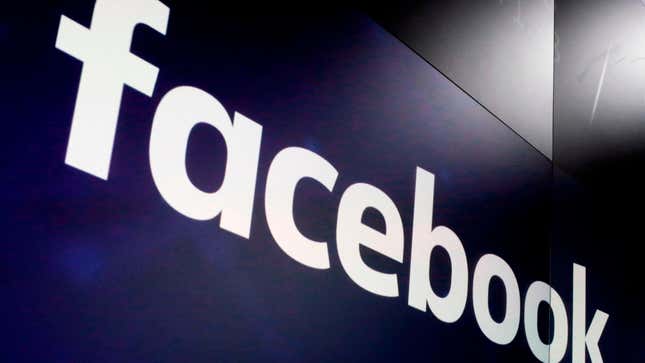
On Thursday, Facebook announced it was taking new steps to help combat climate change misinformation on its platform, including creating a grant program to invest in fact-checking initiatives worth a whole $1 million dollars. (So generous to throw the spare change you found in between your couch cushions at this problem, Mark Zuckerberg!)
It comes with a slew of other announcements, but they’re window dressing on a real problem. A new report looking at social media and the Texas blackouts released the same day shows Facebook is awash in climate misinformation that a few tweaks won’t fix. A staggering 99.1% of interactions on the top social media posts pushing lies about wind energy causing the blackouts happened on posts with no fact check label.
“They’re moving deck chairs on the Titanic,” Michael Khoo, who runs the disinformation campaign at Friends of the Earth, said of the new policies. “They’re not looking at the real problem of misinformation.”
In addition to $1 million Facebook pledged, the company also said it will expand the Climate Science Information Center it created last year to help fact-check posts on the site. Now, Facebook said, the feature—which they’re renaming the Climate Science Center—will be updated with “additional features to better inform and engage our community on climate change,” including new facts about climate change and quizzes to test users’ climate knowledge.
A few Buzzfeed circa 2015-style quizzes and a mere $1 million from a company currently valued at more than $1 trillion doesn’t sound like much. And as the new report from Friends of the Earth illustrates, Facebook’s climate misinformation problem runs deep. The report looks at misinformation that spread on Facebook, Twitter, YouTube, and other social media platforms in the wake of the Texas blackouts last February, six months after Facebook created the Climate Science Information Center and started fact-checking posts.
If you’ll recall, an image of a frozen turbine spread like wildfire on right-wing social media spaces, erroneously labeled as a photo of a Texas turbine during the cold snap. The lie that frozen turbines caused the blackouts was then widely picked up by Republican politicians and talking heads, fueled by climate disinformation groups with ties to the oil and gas industry. (The lie had real political ramifications: Texas politicians pushed to financially hogtie renewable energy during the legislative session in the spring, claiming that their “lack of reliability” during the blackout meant the state needed more financial backing from those industries.)
The report notes that national and local news outlets were quick to debunk the image. “Outlets generally don’t straight up print climate denial anymore,” Khoo said. “But on social media, you can put up that image and it racks up millions of views. To me, that makes Facebook the last bastion of climate denial.”
Facebook did do some due diligence and mark posts with the wind turbine image with a fact-checking label. The Friends of the Earth analysis found that some 90% of the 10 highest-performing posts with the actual image of the turbine were given a fact-checking popup, noting that the post had “Partly False Information” and directing users to fact-checked articles on the photo. But these posts, the analysis finds, had comparatively little engagement, making up just over 6,250 interactions—likes, comments, and shares—between them.
Meanwhile, other posts containing misinformation but no turbine photo—like a post from Rep. Dan Crenshaw erroneously blaming wind turbines and a post by Fox News linking to a Tucker Carlson segment on the turbines—were allowed to spread to much larger audiences without fact check tags, generating hundreds of thousands of interactions. Using Crowdtangle data on the top-performing Facebook posts, Friends of the Earth estimated that less than 1% of users’ interactions with the top social media posts containing the false wind turbines narrative contained a fact-checking label.
This number, Khoo noted, could actually be larger or smaller, because Facebook doesn’t make its fact-checking metrics or other strategies to counter misinformation—including how it decreases the circulation of false posts, a tactic it described in its announcement last year—public. “This is the frustration: The denominator is the black box,” Khoo said. “They say, ‘we de-emphasize the post,’ but it obviously doesn’t work because these numbers show it didn’t stop it from being widespread. This report is only based on what Crowdtangle can see, or what scanning through individual posts can see. There’s a much easier number, and they’re not giving it to us.”
“This report clearly states that our fact-checking partners quickly debunked false claims about the Texas storm and that we labeled ninety percent of the highest-performing posts containing a false wind turbine image,” a Facebook spokesperson said in an email. “Many of the examples in the report cited as not having labels are simply positions that the organization disagrees with. We’re connecting people to authoritative and up-to-date information about climate change through the Climate Science Center, and today we announced new features to further reduce misinformation on our platform.”
Facebook and other platforms, Khoo said, could be much more aggressive in how they approach climate denial on their platforms. Many of the most proficient climate denial posters, like Tucker Carlson, are repeat offenders. “I fully believe, and have argued to [Facebook], that you need to put a circle around them and advance suppress their discussion about climate change until they’re fact-checked,” Khoo said. “This is not a freedom of speech issue—they can talk about climate change, they just have to talk about it accurately.”
Khoo also pointed to a study showing that misinformation about the election dropped by more than 70% after Trump and other right-wing leaders were booted off Twitter.
“I’m a big fan of deplatforming the known liars,” he said. “You get rid of the liars, and guess what, you have fewer lies.”
Update 9/16/21 10:19 A.M. ET: This post has been updated with a comment from Facebook.